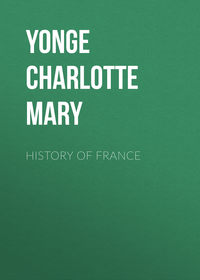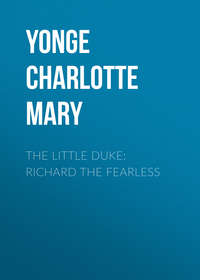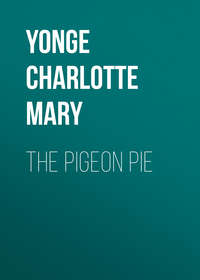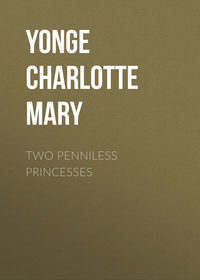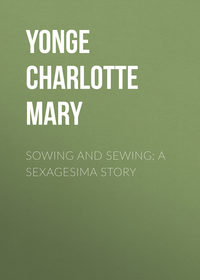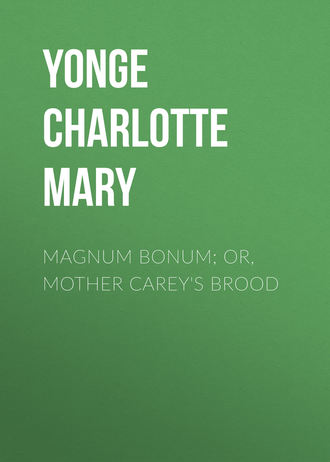 полная версия
полная версияПолная версия
Magnum Bonum; Or, Mother Carey's Brood
“That’s a disgrace.”
“A grace,” said provoking Bobus. “She is much nicer as she is, than you will ever be.”
“Don’t talk such nonsense,” said Janet, with an elder sisterly air. “It is not kind to encourage Jessie to think anyone can care for an empty-headed doll.”
“Empty-headed dolls are all the go,” said Bobus. “Never mind, Jessie, a girl’s business is to be pretty and good-humoured, not to stuff herself with Latin and Greek. You should leave that to us poor beggars!”
“Yes, I know, that’s all your envy and jealousy,” retorted Janet.
All the time Jessie stood by, plump, gentle, and pretty, though with a certain cloud of perplexity on her white open brow, and as her aunt returned into the room, she said—
“I think my sum is right now, Aunt Caroline; but Bobus helped me. Must I do it over again?”
“You shall begin with it to-morrow, my dear,” said her aunt; “then I daresay it will go off easily.”
Jessie thanked with an effusion of gratitude which made her prettier than ever, and then was claimed by Bobus to help him in the making of some paper bags that he needed for some of his curiosities.
Janet liked to fancy that it was beauty versus genius that made Jessie the greater favourite. She had not taken into account that she was always too much engrossed with her own concerns to be helpful, while Jessie’s pretty dexterous hands were always at everyone’s service, and without in the least entering into the cause of science, she was invaluable in the museum, whenever her ideas of neatness and symmetry were not in too absolute opposition to the requirements of system.
The two little ones, Essie and Ellie, were equally graceful, or indeed still more so, as being still in their kittenhood, and their attitudes were so charming as to revive their aunt’s artistic instincts.
All the earlier part of the year, when her time was her own, it had been mere wretchedness and heart-sickness to think of the art which had given her husband so much pleasure, and, but for Allen, the studio would never have been arranged. But no sooner was her time engrossed, than the artist fever awoke in her, and all the time she could steal by early rising, or on wet afternoons, and birthday holidays, was devoted to her clay.
Before the end of the autumn she had sent up to Mr. Acton some lovely little groups of children, illustrating Wordsworth’s poems. She had been taught anatomy enough to make her work superior to that of most women, and Mr. Acton found no difficulty in disposing of them to a porcelain manufactory, to be copied in Parian, bringing in a sum that made her feel rich.
Vistas opened before her sanguine eyes of that clay educating her son for the Magnum Bonum, her great thought. Her boys must be brought up to be worthy of the quest, high-minded, disinterested, and devoted, as well as intellectual and religious. So said their father; and thus the Magnum Bonum had become very nearly a religion to her, giving her a definite aim and principle.
Unfortunately there was not much in her present surroundings to lead her higher. The vicar, Mr. Rigby, was a dull, weak man, of a wornout type, a careful visitor of the sick and poor, but taking little heed to the educated, except as subscribers and Sunday-school teachers. Carey had done little in the first capacity, Janet had refused to act in the latter.
His sermons were very sleepy performances, except for a tendency to jumble up metaphors, that kept the audience from the Folly just awake enough to watch for them. The hearer was proud who could repeat by heart such phrases as “let us not, beloved brethren, as gaudy insects, flutter out life’s little day, bound to the chariot wheels of vanity, whirling in the vortex of dissipation, until at length we lie moaning over the bitter dregs of the intoxicating draught.” Some of these became household proverbs at “the Folly,” under the title of “Rigdum Funnidoses,” and might well be an extreme distress to the good, reverent, and dutiful Jessie.
Mrs. Rigby was an inferior woman, a sworn member of the Coffinkey clique, admiring and looking up to her Serene Highness as the great lady of the place, and wearing an almost abject manner when receiving good counsels from her. Neither of them commanded respect, nor were they likely to change the belief, which prevailed at the Folly, that all ability resided among the London clergy.
CHAPTER XI. – UNDINE
Lithest, gaudiest harlequin, Prettiest tumbler ever seen, Light of heart and light of limb. Wordsworth.Long walks continued to be almost a necessity to Mrs. Joseph Brownlow, even when comparatively sobered down, and there were few days on which she was not to be met a mile or two from Kenminster, attended by a train of boys larger or smaller, according to the demands of the school for work or play.
The winter was of the description least favourable to collective boyish sports, as there was no snow and very little frost. The Christmas holidays led to more walking than ever. The gravelled roads of Belforest were never impassable, even in moist weather; and even the penetralia of the place had been laid open to the Brownlows, in consequence of a friendship which the two Johns had established with Alfred Richards, the agent’s son. They had brought him in to see the museum, and he had proved so nice and intelligent a lad, that Mother Carey, to the great scandal of her Serene Highness, allowed Jock to ask him to partake of a birthday feast.
When Allen came home at Christmas, he introduced stilt walking, and the Coffinkey world had the pleasure of communicating to one another that “Mrs. Folly Brownlow” had been seen with all her boys walking on stilts; and of course in the next stage, Mrs. “Folly” Brownlow herself was said to have been walking on stilts with all her boys, a libel, which caused Mrs. Robert Brownlow much pain and trouble in the contradiction.
“Poor Caroline! walking seemed to be necessary to her health, and she was out a great deal, but always walking along in the lanes on foot with her little girls—yes, I assure you, always on foot!”
It was thus that Caroline, with Babie and Armine, was descending a hill on the other side of Belforest Park, fully employed in picking the way through the mud from stone to stone, when a cry of dismay came to them from a distance, and whilst they were still struggling towards a gate, which broke the line of the high hedge, the two Johns came back at speed, crying—“Mother, Mother Carey! come quick, here’s Allen had a spill—came down on his shoulder—his stilt went into a hole, and he went right over; they think he must have broken something, he howls so when they touch him.”
Feeling her limbs and breath inadequate to bear her on as fast as her spirit flew forward, Caroline dashed through the slippery mud far too swiftly for poor little Babie to keep up with her, leaving one boy to take care of the little ones, while the other acted as her guide down the long steep lane. She was unable to see over the hedges till she came through a gate into a meadow, where Jock looked about, rubbed his eyes, and exclaimed—“Hallo, where are they?” pointing to the place where Allen had fallen, but whence he seemed to have been spirited away like Sir Piercie Shafton. However, Rob and Joe came running out of a farmyard at a little distance, with tidings that Allen had been taken in there, and replying to her breathless question, that they could not tell how much he was hurt.
A fine looking white-haired farmer met her next, saying—“Your young gentleman is not very seriously hurt, ma’am. I think a dislocation of the shoulder is the extent of the injury. He is feeling rather faint, but you must not be alarmed.”
It was spoken with a kind courtesy that gave her confidence, and the old man led her to the parlour, where his daughter-in-law, a gentle looking person, was most kindly attending on Allen, who lay on the sofa, exceedingly white, and in much pain, but able to smile at his mother, and assure her that he should soon be all right.
“Had they sent for a surgeon?”
“No, but they had sent for a bone-setter, who would be there in a minute.”
The old farmer explained that it would be two hours at the least before a surgeon could be fetched from Kenminster, while Higg, the blacksmith, who lived close at hand, was better for man and beast than any surgeon he had known, and his son had instantly set out to fetch him. As the mother doubtfully asked of his fitness, instances were quoted of his success. The family had a “gift,” inherited and kept up from time immemorial, and the farmer’s wife declared that he was as tender as possible; she had seen him operate on a neighbour’s child, and should not be afraid to trust him with one of her own.
The man’s voice was heard; they went out to speak to him, and Caroline was left with her boy.
“What do you think, Ali, my dear,” she said, kneeling by him, “I have often heard dear papa speak of the wonderful instinct of those bone-setting families.”
“I’d have nothing to do with a humbugging quack,” put in Bobus.
“He may humbug as much as he likes, if he’ll only get me out of this pain,” said poor Allen.
“He will only make it ever so much worse, and then you’ll have to have it done over again,” croaked Bobus.
“That is not the way to talk of it, Bobus,” said his mother. “I know a dislocated shoulder does not require any great skill, and that promptness is of greater use than knowledge in such a case.”
“Well, if you like to encourage abominable humbug and have Allen lamed for life, I don’t,” said Bobus. “I shan’t stay in the house with the blackguard.”
He stalked out of the room with great loftiness of demeanour, just as the operator was being introduced—a tall, sinewy man, with one of those strong yet meek faces often to be found among the peasantry. He came in after the old farmer, pulling his forelock to the lady, and waiting for orders as if he had been sent for to mend the grate; but Caroline saw in a moment that he was a man to trust in, and that his hands were not only clean, but were well-formed, and powerful, with a great air of dexterity.
“I am afraid my boy’s arm is put out,” she said, trembling a good deal.
“Yes, ma’am.”
“And—and,” said she, feeling sick, and more desolate and left to her own judgment than ever before. “Can you undertake to push it in again.”
“Please God, ma’am,” Higg said, gravely, coming nearer for examination.
Allen shrank and shuddered.
“Won’t it hurt awfully?” he asked.
“Well, sir, it won’t just be a bed of roses, but it won’t last, not long, if you sets your will to it.”
He asked for various needments, and while he was inspecting them, Allen’s courage began to fail, and he breathed out whispers that the man was rougher and more ignorant than he expected, and they had better wait and send to Kenminster for a doctor; but those who thought Caroline helpless and childish would have been amazed at the gentle resolution with which she refused to listen to his falterings, and braced him to endure, knowing well that her husband had said that skill was hardly needed in such a case, only resolution. She would not let herself be taken out of the room, and indeed never thought of herself, only of Allen, whose other hand she held, and to whom she seemed to give patience and courage. When all was well over, there was a hospitable invitation to the patient to remain till he was fit to return, and an extension of the invitation to his mother, but with promises of every care if she must leave him, and this she was forced to decide on doing, as such a household as hers could not well spare her, especially on a Saturday evening; and she also saw that the inconvenience to her hosts would have been great.
Allen was so much relieved, that she had no fear of leaving him to these kind people, to whom she had taken a great fancy.
“I shall learn the habits of the genuine species, British farmer,” said he, as his mother kissed him, and declared him the best and most conformable of boys.
Old Mr. Gould would not be denied driving her home in his gig, and when she thought about it, she found she had a strange relaxed aching of the knees, which made her glad of kindness for herself and the little ones. In the fine old kitchen she found that Armine had had an overpowering fit of crying, which had been kindly soothed by motherly Mrs. Gould, and the whole party were partaking of a luxurious tea, enlivened by mince pies and rosy-cheeked apples, which had diverted his attention to the problem why the next year’s prosperity should depend on the number of mince pies consumed before Christmas.
Bobus was not among them, having marched off in his contempt of the bone-setter, and his mother was not without fears that he might bring a real surgeon down on her at any moment, so she quickly drank off her cup of tea, and took her seat in Farmer Gould’s gig with Babie as bodkin in front, and Joe and Armine in the little seat behind. Robin and the two Johns were to stilt themselves home, while she was taken so long and rugged a way, that at every jolt she was ready to renew her thanks for sparing it to her son’s shoulder; and they were at home before her.
The whole family came pouring out to meet her, and the Colonel made warm acknowledgments of the farmer’s kindness, speaking of him when he was gone as one of the most estimable men in the neighbourhood, staunch in his politics, and very ill-used by old Barnes of Belforest.
Caroline looked anxiously for Bobus; and Janet, who had stayed at home to finish some papers for her essay society, said that he had only hurried in to tell her and take off his stilts, and had then gone down to Dr. Leslie’s.
“Then has Dr. Leslie gone? We did not meet him, but he may have gone through Belforest,” exclaimed Caroline.
“O no, he has not gone; he would not when he heard about that Higg,” said Janet, with uneasy and much disgusted face. “He couldn’t do any good after his meddling.”
“Do you mean that he said so?” asked Carey, much alarmed.
“Never mind,” said the Colonel, “you did quite right, Caroline, whatever the doctor says. Any man of sense, with good strong hands, can manage a shoulder like that, and I should have thought Leslie had sense to see it; but those professional men can’t stand outsiders.”
“Where is Bobus?” asked Caroline; “I should like to distinguish between what Dr. Leslie said to him and what he told Janet. He might be more zealous for Dr. Leslie than Dr. Leslie for himself.”
Bobus was unearthed, and by much pumping was made to allow that Dr. Leslie had told him that there was nothing more to be done, and that his brother was quite safe in Higg’s hands; but Bobus evidently did not believe it. He kept silence while his uncle remained, but he had hunted up his father’s surgical books, and went on about humeral clavicles and ligatures all the evening, till his mother felt sick, in the nervous contemplation of possibilities, though her better sense was secure that she had done right, while Janet was moodily silent and angered with her, in the belief that she had weakly let Allen be injured for life; and Bobus seemed as if he had rather it should be so than that he should be wrong, and Higg’s native endowments turn out a reality.
Caroline abstained from looking at the book herself, partly because she thought she might only alarm herself the more without confuting Bobus, and partly because she knew that the old law which forbade Janet to meddle with the medical books, would be considered as abrogated if she touched them herself.
Both she and Janet were much more anxious than they confessed, except by the looks which betrayed their broken rest the next morning. Each was bent on walking to River Hollow, and they would fain have done so immediately after breakfast, but to take the whole tribe was impossible; and to let them go to Church without her, would infallibly lead to Jock’s getting into a scrape with his relatives, if not with the whole congregation. Was it not all her eyes could do to hinder palpable smiles in the sermon, and her monkey from playing tricks on his bear, who, by some fatality, always sat in front, with his irresistible broad back, down which, in spite of all her vigilance, Jock had once thrust a large bluebottle fly. She also knew that both her husband and his mother would have thought she ought to go to Church, and that if matters went amiss with her boy, she should reproach herself with the omission. Her children, too, influenced her, though very oppositely, for Janet was found preparing to start for River Hollow, and on being told that she must wait, to go with her mother, till after Church, declared defiantly that “she saw no sense in staying at home to hear Rigdum when she did not know how ill Allen might be.”
“You would not have said that to grandmamma,” said Carey.
“Well, if you like to go to Church, you can. I can go alone.”
“No, I will not have you take that long walk alone.”
“Then I will take one of the boys.”
“No, Janet, I mean to be obeyed. Go and put on your other hat, and do not make us late for Church.”
Janet was forced to submit, for she never came to the point of actual disobedience to her mother. Caroline’s ruffled feelings were soothed by little Armine, who ran in from feeding his rabbits to ask to have the place in his Prayer-book shown to him where he should pray for poor Allen. She marked the Litany sentence for him, and meant to have thrown her own heart into it, but when the moment came, her mind was far astray, building vague castles about her boys.
Still she felt as if her church going had its reward, for Dr. Leslie met her a little way outside the porch, and, after asking after her boy, said—
“I hope his brother explained to you that Higg is quite to be trusted. He always knows what he can do, and when a case is beyond him. If I had come there would have been nothing for me to do.”
“There!” said Jock, triumphantly to his brother and sister.
“Much you know about it,” grunted Bobus.
“Mother Carey was right. She always is,” persisted Jock.
“It would have been just the same if the man had known nothing about it,” said Janet. “I hate your irregular practitioners, and it was very weak in mother to encourage them.” Then, as Bobus snarled at the censure of his mother—“You said so yourself yesterday.”
“I didn’t say any such beastly thing of mother. She could tell whether it was just a simple dislocation, and she was right, having ever so much more sense than you, Janet.”
“You didn’t say so yesterday,” repeated Janet.
“I don’t like irregular practitioners a bit better than you do, Janet,” said Bobus with dignity; “and I thought it right to call in a qualified surgeon, but I never said mother couldn’t judge.”
However, Bobus would not countenance the irregular practitioner by escorting his mother to River Hollow; and as he was in one of the surly moods in which he was dangerous to any one who meddled with him, especially Janet, his mother was glad not to have to keep the peace between them.
Janet, though not in the most amiable mood, chose to go with her, and they set forth by the shorter way, across Belforest park, skirting the gardens where the statues stood up, looking shivery and forlorn, as if they were not suited to English winters, and the huge house looked down on them like a London terrace that had lost its way, with a dreary uninhabited air about it. Even by this private way they had two miles and a half of park to traverse, before they reached a heavy miry lane, where the beds of mud, alternated with rugged masses of stone, intended to choke them. It led up between high hedges to the brow of one of the many hills of the county, whence they could look down into the hollow, a perfect cup, scooped out as it were between the hills that closed it in, except at the outlet of the river that intersected it, making the meadow on either side emerald green, even in the winter. Corn lands of rich red soil, pasture fields dotted with cattle, and broad belts of copse wood between clothed the slopes; and a picturesque wooden bridge, with a double handrail, crossed the river. The farm-house, built of creamy stone, stood on the opposite side of the river, some way above the bank, and the mother and daughter agreed that it deserved to be sketched next summer.
They had to pick their way down a lane that was almost a torrent, and emerging at the foot of the bridge, they stood still in amazement, for in the very centre was something vibrating rapidly, surrounded by a perfect halo of gold and scarlet. It was like a gigantic humming-bird moth at first, but it presently resolved itself into a little girl, clad in something dark purple below, and above with a bright scarlet cloaklet, which flew out and streamed back, beneath the floating locks of glistening gold that glinted in the sun, as with a hand on each rail of the bridge she swung herself backwards and forwards with the most bewildering rapidity. Suddenly becoming aware of the approach of strangers, she stood for one moment gazing in astonishment, then fled so swiftly that she almost seemed to fly, and vanished in the farm buildings!
They stood laughing and declaring that Babie would be convinced that fairies came out on Sunday, then crossed the river and were beginning to ascend the path when a volley of sounds broke on them, a shrill yap giving the alarm, louder notes joining in, and the bass being supplied by a formidable deep-mouthed bark, as out of the farmyard-gate dashed little terrier, curly spaniel, slim greyhounds, surly sheep-dog of the old tailless sort, and big and mighty Newfoundland, and there they stood in a row, shouting forth defiance in all gradations of note, so that, though frightened, Carey and Janet could not help laughing, as the former said—
“This comes of gadding about on Sunday.”
“If we went on boldly they would see we are not tramps,” said Janet.
“Depend on it they will let no one pass in Church time.”
So it proved, for Janet’s attempt to move forward elicited a growl from the sheep-dog, and a leap forward of the “little dogs and all,” which daunted even her stout heart.
However, calls were heard, and the bright vision of the bridge came darting among the dogs, scolding and driving them in, and Allen himself came out to the gate, all bandaged up on one side, but waving his arm as a signal to his mother and sister to advance. They did so nervously but safely, while the growls of the sheep-dog sounded like distant thunder, and the terrier uttered his protest from the door. Allen declared himself much better, and said he should be quite able to go home to-morrow, only this was such a jolly place; and then he brought them into the beautiful old kitchen with a magnificent open hearth, inclosed by two fine dark walnut-wood settles, making a little carpeted chamber between them. Here Allen had the farmer’s armchair and a footstool, and with “Foxe’s Martyrs” open at a flaming illustration on the little round table before him, appeared to be spending his Sunday as luxuriously as the big tabby cat who shared the hearth with him.
“They have only one service at Woodbridge, morning and afternoon by turns,” he explained, “and so they are all gone to it.”
“Who is that girl?” asked Janet.
“Undine,” he coolly replied.
“She certainly appeared on the bridge,” said his mother, “but I should think Undine’s colouring had been less radiant—more of the blue and white.”
“She had not a whiter skin nor bluer eyes,” said Allen, “nor made herself more ridiculous either. Did you ever see such hair, mother? Hullo, Elfie. There she is, peeping in at the window, just as Undine did; Come in!” he cried at the door. “No, not she,” as he returned baffled; “she is off again!”
“But, Allen, who is she? Not Farmer Gould’s daughter.”
“Of course not. Don’t you know she was fished up in a net, and belonged to a palace under the ocean full of pearls and diamonds. She took such a fancy to me that no power on earth would make her go to Church with the rest. She ran away, and hid, and when they were all gone she came out and curled herself up at my feet and chattered, till I happened to offend her majesty, and off she went like a shot. I’m only thankful that she did not make her pearly teeth meet in my finger in true Undine fashion.”
“But who is she, really?”
“I can’t quite make out. They call her Elfie, and she calls them grandpapa, and uncle and aunt, but she has been sitting here complaining of everything being cold and dull, and talking about seas and islands, palm-trees, and coral caves, and humming birds, yes, and black slaves, and strings of pearls, so that if she is romancing, like Armine and Babie, she does it uncommonly naturally.”






